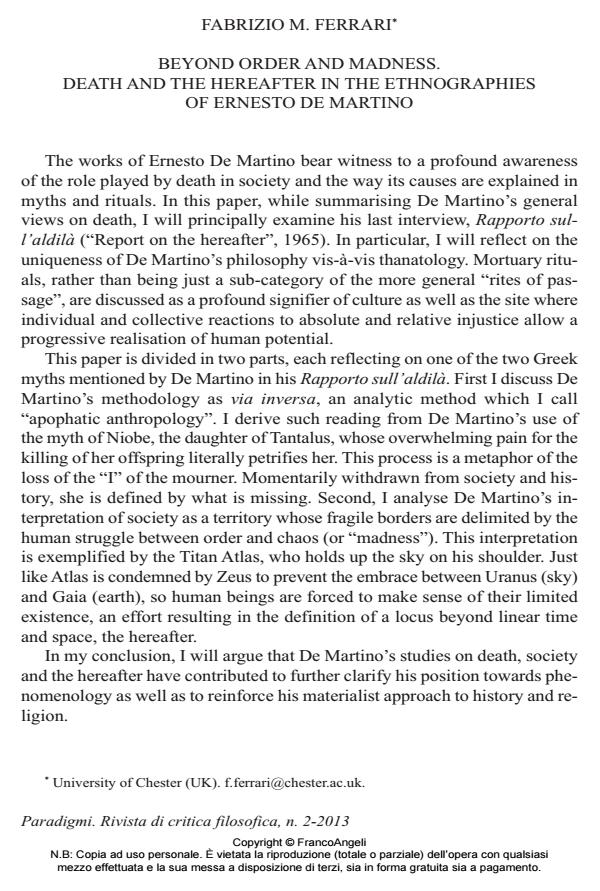Beyond Order and Madness. Death and the Hereafter in the Ethnographies of Ernesto De Martino
Titolo Rivista PARADIGMI
Autori/Curatori Fabrizio M. Ferrari
Anno di pubblicazione 2013 Fascicolo 2013/2 Lingua Italiano
Numero pagine 16 P. 51-66 Dimensione file 118 KB
DOI 10.3280/PARA2013-002005
Il DOI è il codice a barre della proprietà intellettuale: per saperne di più
clicca qui
Qui sotto puoi vedere in anteprima la prima pagina di questo articolo.
Se questo articolo ti interessa, lo puoi acquistare (e scaricare in formato pdf) seguendo le facili indicazioni per acquistare il download credit. Acquista Download Credits per scaricare questo Articolo in formato PDF

FrancoAngeli è membro della Publishers International Linking Association, Inc (PILA)associazione indipendente e non profit per facilitare (attraverso i servizi tecnologici implementati da CrossRef.org) l’accesso degli studiosi ai contenuti digitali nelle pubblicazioni professionali e scientifiche
The paper discusses the views of Ernesto De Martino on thanatology. Although De Martino worked extensively of mortuary rituals and myths and beliefs related to death, little has been said about his last interview, Rapporto sull’aldilà ("Report on the hereafter"). The author explores here the philosophical and anthropological argument of De Martino vis-à-vis themes such as ritual, presence and labour, and the way they relate to death as a cultural construction. Borrowing from Marxist anthropology and continental philosophy, the paper argues that De Martino was eventually sceptical of classic phenomenology and developed a philosophical approach which was deliberately polemic towards the dominating ideology of the 1950s and 1960s academic study of religion.;
Keywords:Aldilà, antropologia marxista, apofaticismo, fenomenologia, morte, tanatologia.
- Foucault M. (1977). Discipline and Punish. New York: Pantheon.
- Foucault M. (2007). Madness and Civilization (Reprint 1961). London and New York: Routledge.
- Ginzburg C. (2010). Mircea Eliade’s Ambivalent Legacy. In: Wedemeyer C.K. and Doniger W., eds., Hermeneutics, Politics, and the History of Religions: The Contested Legacies of Joachim Wach and Mircea Eliade. Oxford and New York: Oxford University Press: 307-323, DOI: 10.1093/acprof:oso/9780195394337.001.000
- Golding S. (1988). The Concept of the Philosophy of Praxis in the Quaderni of Antonio Gramsci. In: Nelson C. and Grossberg L., eds., Marxism and the Interpretation of Culture. Champaign, IL: University of Illinois Press: 543-563.
- Lotman J. (2005). On the Semiosphere (First published in Russian in 1984). Sign System Studies, 33, 1: 205-229.
- Marx K. and Engels F. (1947). The German Ideology. New York: International Publishers.
- Mauss M. (1934). Les Techniques du corps. Journal de Psychologie Normale et Pathologique, 32, 3-4: 271-293.
- Mauss M. (1966) The Gift. Forms and Functions of Exchange in Archaic Societies. London: Cohen and West.
- Mukharji P.B. (2012). Chandshir Chikitsha. A nomadology of subaltern medicine.
- In: Hardiman D. and Mukharji P.B., eds., Medical Marginality in South Asia. Situating Subaltern Therapeutics. London and New York: Routledge: 85-108.
- Negri A. (2009). The Labor of Job. The Biblical Text as a Parable of Human Labor. Durham and London: Duke University Press.
- Ricoeur P. (2009). Living up to Death. Chicago and London: The University of Chicago Press, DOI: 10.7208/chicago/9780226713502.001.000
- Saïd E.W. (2003). Orientalism (Reprint 1978). London: Penguin Books.
- Weil S. (2001). Oppression and Liberty (Reprint 1955). London and New York: Routledge.
- Žižek S. (2007). On Belief. London and New York: Routledge.
- Flood G. (2012). The Importance of Religion. Meaning and Action in Our Strange World. Oxford: Wiley-Blackwell.
- Ferrari F.M. (2012). Ernesto De Martino on Religion. The Crisis and the Presence. Sheffield: Equinox.
- Eagleton T. (2009). Reason, Faith, and Revolution. Reflections on the God Debate. New Haven and London: Yale University Press.
- Durkheim É. (2005). Suicide. A Study in Sociology (Reprint 1897). London and New York: Routledge.
- Di Nola A. (1998). How Critical was De Martino’s “Critical Ethnocentrism” in Southern Italy? In: Schneider J., ed., Italy’s “Southern Question”: Orientalism in One Country. Oxford and New York: Berg: 157-175.
- Derrida J. (2007). Writing and Difference. London and New York: Routledge.
- Derrida J. (1992). Postscriptum: Aporias, Ways and Voices. In: Coward H. and Foshay T., eds., Derrida and Negative Theology. Albany: State University of New York Press: 283-323.
- Derrida J. (1992). How to Avoid Speaking: Denials. In: Coward H. and Foshay T., eds., Derrida and Negative Theology. Albany: State University of New York Press: 73-142.
- Dentith S. (1995). Bakhtinian Thought. London and New York: Routledge.
- Daboo J. (2010). Ritual, Rapture and Remorse. A study of Tarantism and Pizzica in Salento. Bern: Peter Lang.
- Crapanzano V. (2004). Imaginative Horizons. An Essay in Literary-Philosophical Anthropology. Chicago and London: The University of Chicago Press.
- Colebrook C. (2011). Time and Autopoiesis: the Organism has no Future. In: Guillaume L. and Hughes J., eds., Deleuze and the Body. Edinburgh: Edinburgh University Press: 9-28, DOI: 10.3366/edinburgh/9780748638642.001.000
- Cherchi P. (2010). Il cerchio e l’ellisse. Etnopsichiatria e antropologia religiosa in Ernesto De Martino: le dialettiche risolventi dell’“autocritica”. Cagliari: Aìsara.
- Cherchi P. (1996). Il peso dell’ombra. L’etnocentrismo critico di Ernesto De Martino e il problema dell’autocoscienza culturale. Napoli: Liguori.
- Bourdieu P. (2007). Distinction: A Social Critique of the Judgement of Taste. Cambridge, MA: Harvard University Press.
- Bauman Z. (1992). Mortality, Immortality and Other Life Strategies. Cambridge: Polity Press.
- Bakhtin M.M. (2004). Speech Genres and Other Late Essays. Austin, TX: The University of Texas Press.
- Angelini P. (2001). L’uomo sul tetto. Mircea Eliade e la “storia delle religioni”. Torino: Bollati Boringhieri.
- Adorno T. (2005). Reason and sacrifice. In: Mendieta E., ed., The Frankfurt School on Religion. Key Writings by the Major Thinkers. London and New York: Routledge: 149-175.
Fabrizio M. Ferrari, Beyond Order and Madness. Death and the Hereafter in the Ethnographies of Ernesto De Martino in "PARADIGMI" 2/2013, pp 51-66, DOI: 10.3280/PARA2013-002005